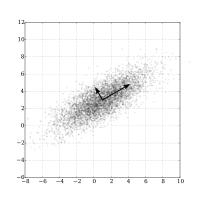
Photo from wikipedia
We present a general framework for causal mediation analysis using nonparametric Bayesian methods in the potential outcomes framework. Our model, which we refer to as the Bayesian causal mediation forests… Click to show full abstract
We present a general framework for causal mediation analysis using nonparametric Bayesian methods in the potential outcomes framework. Our model, which we refer to as the Bayesian causal mediation forests model, combines recent advances in Bayesian machine learning using decision tree ensembles, Bayesian nonparametric causal inference, and a Bayesian implementation of the g-formula for computing causal effects. Because of its strong performance on simulated data and because it greatly reduces researcher degrees of freedom, we argue that Bayesian causal mediation forests are highly attractive as a default approach. Of independent interest, we also introduce a new sensitivity analysis technique for mediation analysis with continuous outcomes that is widely applicable. We demonstrate our approach on both simulated and real data sets, and show that our approach obtains low mean squared error and close to nominal coverage of 95% interval estimates, even in highly nonlinear problems on which other methods fail. (PsycInfo Database Record (c) 2022 APA, all rights reserved).
Journal Title: Psychological methods
Year Published: 2022
Link to full text (if available)
Share on Social Media: Sign Up to like & get
recommendations!